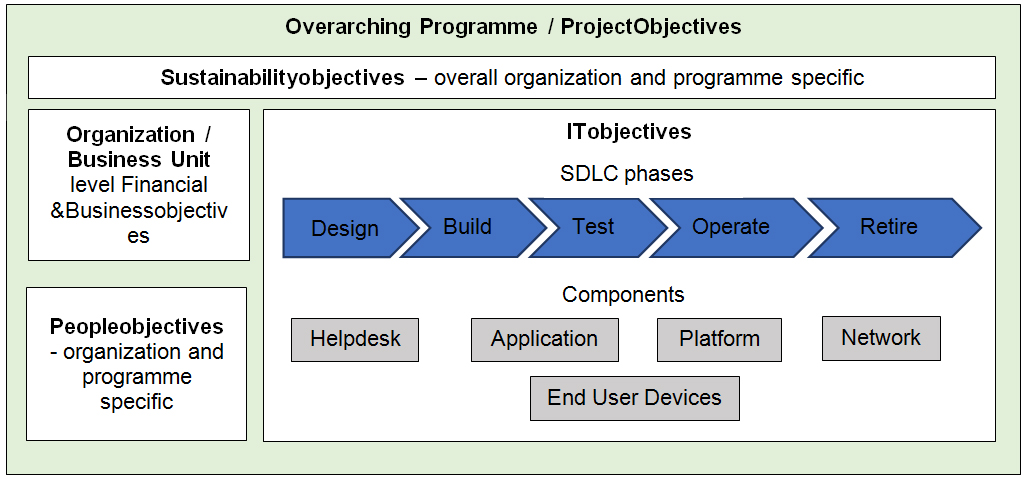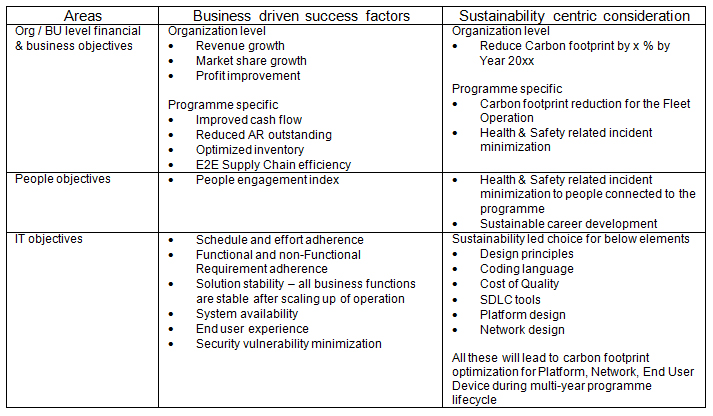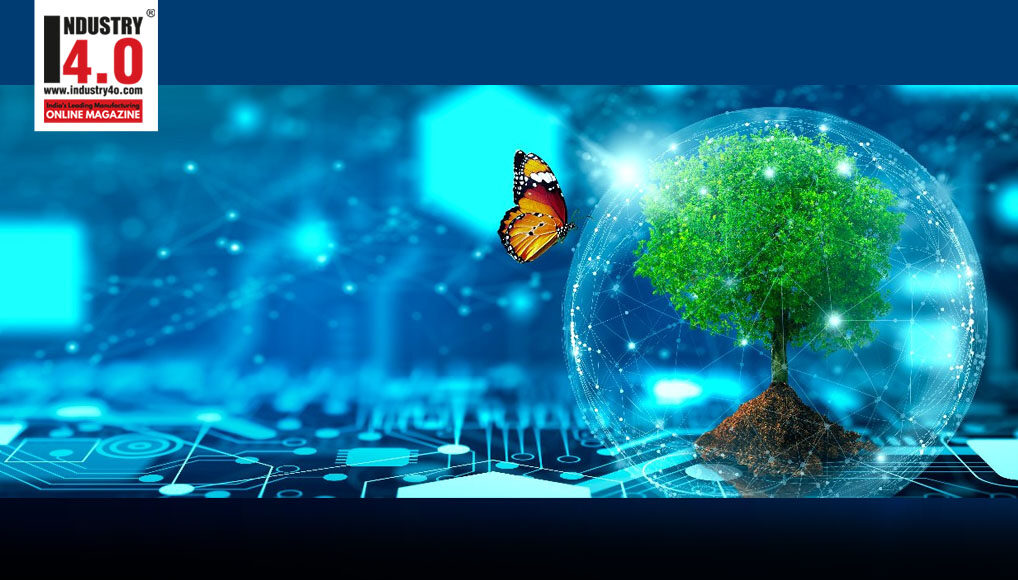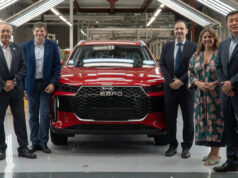Sustainability Centric Software Development Life Cycle (SDLC): Business Case framing and evaluation framework
Over last few years, an accelerated sense of urgency has crept in our minds to address the key question regarding how to make world a more sustainable place so that we leave a better place to live for our future generations. While global political leaders, climate activists and common people at large are thinking, planning, and acting on it in different scales and ways, all of us who are engaged in IT profession have our own roles to play about reinforcing sustainability in our sphere of influence and control.
 Today, as IT Professionals, we live and breathe through numerous IT Programmes / Projects for our clients. While we have started talking about concepts around Sustainability in different areas of Software Development Life Cycle, whether in traditional waterfall method or in Agile methodology, we need to evolve a holistic framework to infuse sustainability mindset in every stage right from business case framing and evaluation to design, build, operate phases in the lifecycle.
Today, as IT Professionals, we live and breathe through numerous IT Programmes / Projects for our clients. While we have started talking about concepts around Sustainability in different areas of Software Development Life Cycle, whether in traditional waterfall method or in Agile methodology, we need to evolve a holistic framework to infuse sustainability mindset in every stage right from business case framing and evaluation to design, build, operate phases in the lifecycle.
While this is a wide area of deliberation, for this edition of the article, the focus will be on how sustainability perspective can be considered during Business Case framing and evaluation of an IT Programme.
To drive home the point through an example, let us consider a hypothetical IT Programme which is being conceptualized by a certain client to redesign their Transportation Fleet solution. Their current IT solution manages entire Transportation Fleet planning and tracking for product delivery to their B2B and B2C consumers, route optimization, fleet maintenance etc. Intent of the new IT programme is how to make entire planning and tracking more dynamic, responsive, near real time based, how to improve fleet uptime and availability to remove any delivery bottleneck issue etc. Typical business led RoI (Return on Investment) based decision criteria for such Programmes will generally evolve around a set of financial and business objectives like improving cash flow through better supply chain management, on time delivery performance, predictive fleet maintenance to improve fleet uptime and availability. Programmes are approved and undertaken for execution once business stakeholders get convinced about such RoI measures.
However, sustainability perspective is generally not considered at the forefront while framing and evaluating a Programme / Project business case. As an example, if we reconsider the same hypothetical programme mentioned above through a more active lens of sustainability, we may come up with a new set of evaluation criteria for the proposed programme as outlined below. While the general set of financial and business parameters are still required and important for the programme evaluation, relevance and importance of sustainability objectives should carry active weightage in current business environment.
Carbon footprint reduction:
This objective itself triggers fundamental thinking around re-designing business case of any programme. It will raise valid questions like below:
-
- What type of fleet client has got now
- What type of fuels are used for existing fleet
- Whether there are Electric Vehicle options in certain areas
- Whether route optimization can be done in a way to reduce carbon emission
- Whether you need to continue owning the fleet or outsource to any proven provider who can provide such service at much lower carbon footprint level.
Health and safety improvement :
This is more from humane perspective of redesigning the programme keeping the health and safety of the workers connected to fleet, whether drivers or maintenance crew. Route optimization, maintenance schedules can be designed to ensure workers connected to the programme get a better work-life balance and hazard free work experience.
It may be quite natural and probable for programme stakeholders to get into a trap of taking a rushed myopic view of the evaluation criteria and de-prioritize and de-link sustainability objectives as primary drivers for the programme even though they may be fully aware of the importance of them. Planning and factoring some of these sustainability related parameters will involve bold investment decisions which are to be taken at a more broader organization level rather than a programme level. For this example hypothetical programme, if the company decide to go for a EV fleet introduction to replace their current fossil fuel powered fleet, then that will involve either a substantial capex investment or a tie-up with a third party who can provide EV fleet service. Such decisions are generally not undertaken at a particular programme level. However, a programme like this can and should provoke such questions in the minds of stakeholders who can eventually understand and appreciate the value of overall sustainability goals of our business and society.
Cost of ignoring sustainability objectives can be adverse from many aspects as mentioned below :
Reputational : The company can get a public perception of not being sufficiently serious and aggressive about achieving sustainability goals. Such social posture will inhibit attraction of new talent
Regulatory and financial : Companies who fail to live up to Regulatory compliance will face eventual isolation and seclusion in capital markets resulting in restricted access to required capital for investment for new business growth and technology refresh
Market Competitiveness : Companies paying right attention and investing in sustainability will enjoy a longer term enhanced market share and competitiveness to survive. In essence, a sustainability centric organization will thrive and adapt much better to new business paradigms compared to those companies with a delayed and myopic vision of adopting sustainability in their core operating model
Employee engagement and talent acquisition : Employees, present and future, will opt to work for sustainability driven organization as they will feel companies as a thinking partner not only for them but also for their future generation. In days to come, sustainability will be the strongest thread of ethos and bonding between employer and employees.
Key elements and components of a Sustainability led Business Case Framing and Evaluation Framework for a Programme/Project is outlined in the diagram below. Programme stakeholders can take a balanced evaluation approach covering all the areas and take a decision.

Fig#1: Broad Sustainability led Business Case Framing and Evaluation Framework for a Programme/Project
As per the broad outlined framework diagram above, some of the key areas are elaborated further as below:
- Sustainability objectives to be deliberated for the overall organization and specific elements which are mapped to the programme. E.g., Company may have a broad regulatory body induced objective to reduce emission by a certain percentage by a certain year. While this will drive as an overarching guidance, the programme should articulate specific programme level sustainability goals, e.g., reducing carbon footprint for Fleet operation (pointing to hypothetical example in this article). Such objectives should act as an overriding design principle rather than a secondary non-mandatory KPI.
- Organization, Business Unit level Financial and Business objectives: This will be largely driven by ongoing organization and business unit level motivation for Revenue growth, Market share increase, Profitability improvement.
- People objectives for the organization and specific points connected to the people impacted by the programme are to be considered as well. This area also is often not so emphasized in programme evaluation. It is important to assess whether programme will be a good fit for long term employee engagement and motivation, whether it will result in redundancy in one skill area and hence re-skilling will be needed for re-deployment in other skill areas.
- IT Goals: This will cover not only various phases of SDLC but also various components of IT (Helpdesk, Application, Platform, Network and End User Devices). As one can see, this area is quite broad, and a specific programme may not necessarily encompass all the IT components and SDLC phases. However, stakeholders must consider a granular analysis with sustainability lens for all these areas.
In the context of the hypothetical Transportation Fleet solution redesign programme, how sustainability perspective can be ingrained in programme business case framing and evaluation is illustrated in the following table.

Sustainability led IT Programme conceptualization and re-design is not a matter of straightforward decision as it will involve fine balancing act between current business goals and future sustainability targets. However, business leaders are also aware about how non-compliance to sustainability targets can impact business from various quarters in medium and long term. While there are specific Sustainability oriented programmes which are designed purely around net-zero emission goals, there are vast majority of business growth driven programmes where we need to frame and evaluate the business case through the lens of sustainability. This will need a paradigm change of mindset.
Thomas J. Watson Jr’s iconic statement of ‘good design is good business’ is well known to us. In current and future business outlook, essence of design led by sustainability principles is going to define the long lasting win theme, not only for business and present generation but for our society and future generations. Sustainability is no more a business choice to comply to Corporate Social Responsibility commitment, it is a survival imperative both for business and society.
About the Author:

Mr. Debashis Das
Account Executive at IBM
LinkedIn : https://www.linkedin.com/in/debashis-das-236670bb/
Mr. Dedashis Das has 23+ years of experience in managing large strategic client accounts involving Solution, Sales, Delivery, Transformation, Financial Management by leading multi-cultural global teams.
He is Bestowed with the Following Licenses & Certifications :
https://www.linkedin.com/in/de









